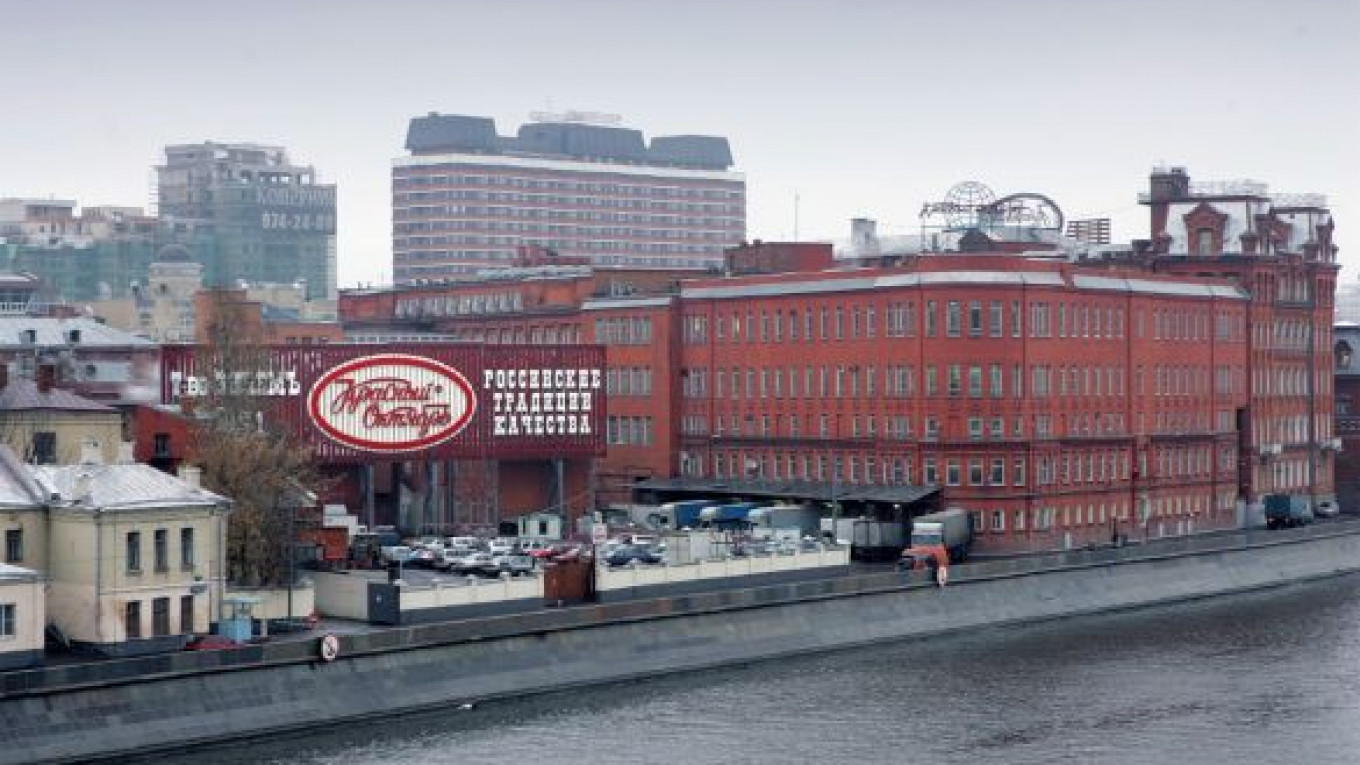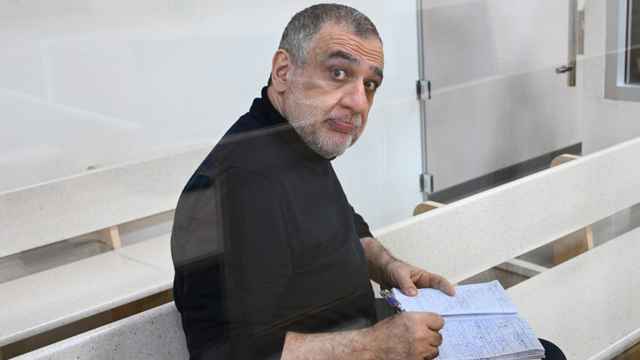Walking along the Moskva River embankment a couple of kilometers from the Kremlin, passersby won't smell the sweet chocolate aroma that filled the air just a few years ago.
It was gone after 2007, when the production facilities of Krasny Oktyabr — one of Russia's oldest confectionary factories — were removed from the city center to the outskirts, to give way to a big development project with cafes and restaurants, apartment complexes, museums and underground parking, which analysts said could be worth more than $120 million.
The project will be implemented on the 50,000 square meters of land on Bersenevskaya embankment, acquired by Guta Development along with the factory's buildings in 2002. The company is currently leasing part of the space out and major tenants include private media outlets like Slon.ru, Openspace.ru, TV channel Dozhd and IT center Digital October.
Due to the number of exhibition halls, the factory's territory has become an art space popular among Muscovites and tourists, but the developer's plans to upgrade the territory raised concerns among city residents that construction work could damage part of the complex and result in tenants being ousted.
Muscovites started collecting signatures online last month to protect the site and preserve the creative atmosphere in the heart of Moscow.
Meanwhile Guta Development's chief executive Artyom Kuznetsov said all the tenants will remain in their offices and that the company hopes to accommodate more "creative studios" at Krasny Oktyabr.
The developer's project to upgrade the factory's territory will also involve locating cafes and restaurants on the first floor and creating a big museum of modern art, he told experts and City Hall officials gathered at a round table last week to discuss Krasny Oktyabr's future.
Krasny Oktyabr, or Red October, was founded in 1851 as a tiny confectionary on Ulitsa Arbat and got the building across from the Kremlin in 1914.
Three of the factory's buildings are landmarks protected by law. Others don't possess that status, but they are valuable for adding to the historic atmosphere of the place, said Natalya Samover, a preservationist with Arkhadzor.
The reason behind residents' concern is the common practice of some developers to save time and money by demolishing the buildings with no landmark status and constructing copies, she told The Moscow Times.
Moscow's chief architect Alexander Kuzmin, who participated in the round table, vowed that no construction would be carried out that could damage the historical buildings on the Krasny Oktyabr territory.
"No decisions on the territory have been made yet," Kuzmin said, adding that City Hall's experts had just created construction regulations for the territory prohibiting high-rise construction or any massive development that would damage the historical buildings.
Kuzmin also said City Hall is working on a project to develop the territory that will undergo public discussions.
If approved by residents, the document, which will specify the maximum volume of space to be built and the location of new buildings, will subsequently be provided to the developer as a base for future construction work.
According to preliminary estimates, the territory around the factory has the potential to accommodate about 40,000 additional square meters of property, Kuzmin said, adding that no offices or retail outlets should be located on the site.
Guta Development plans to build housing on the site as part of the project, Kuznetsov told The Moscow Times, declining to elaborate on the possible construction volumes before City Hall provides all the regulation documents.
Kuzmin supported building the apartment complexes, saying the construction of housing would help keep the place "alive" round the clock, not only in the afternoon. He also proposed building a hotel on the nearby territory owned by City Hall.
Kuzmin said the territory around Krasny Oktyabr is supposed to be turned into a pedestrian area to be included among the city's tourist routes.
For this to happen, Guta Development would have to create underground infrastructure to remove the car traffic and build underground parking for about 2,000 cars, Kuznetsov said.
He declined to specify the overall investment in the project, saying the information is confidential.
Alexander Ziminsky, head of high-end property sales at Penny Lane Realty said it could exceed $120 million based on the potential construction volumes of 40,000 square meters.
The developer invested $400 million in relocating the factory's production facilities, but leasing out the freed space didn't allow it to return the investment, Kuznetsov said.
The company might see returns after building housing on the factory's territory, since the location of the site and the developed infrastructure could bring the approximate apartment price between $15,000 to $30,000 per square meter, Ziminsky said in e-mailed comments.
"If the project includes exclusive penthouses, their price can reach $50,000 per square meter and even more," he said.
A Message from The Moscow Times:
Dear readers,
We are facing unprecedented challenges. Russia's Prosecutor General's Office has designated The Moscow Times as an "undesirable" organization, criminalizing our work and putting our staff at risk of prosecution. This follows our earlier unjust labeling as a "foreign agent."
These actions are direct attempts to silence independent journalism in Russia. The authorities claim our work "discredits the decisions of the Russian leadership." We see things differently: we strive to provide accurate, unbiased reporting on Russia.
We, the journalists of The Moscow Times, refuse to be silenced. But to continue our work, we need your help.
Your support, no matter how small, makes a world of difference. If you can, please support us monthly starting from just $2. It's quick to set up, and every contribution makes a significant impact.
By supporting The Moscow Times, you're defending open, independent journalism in the face of repression. Thank you for standing with us.
Remind me later.






